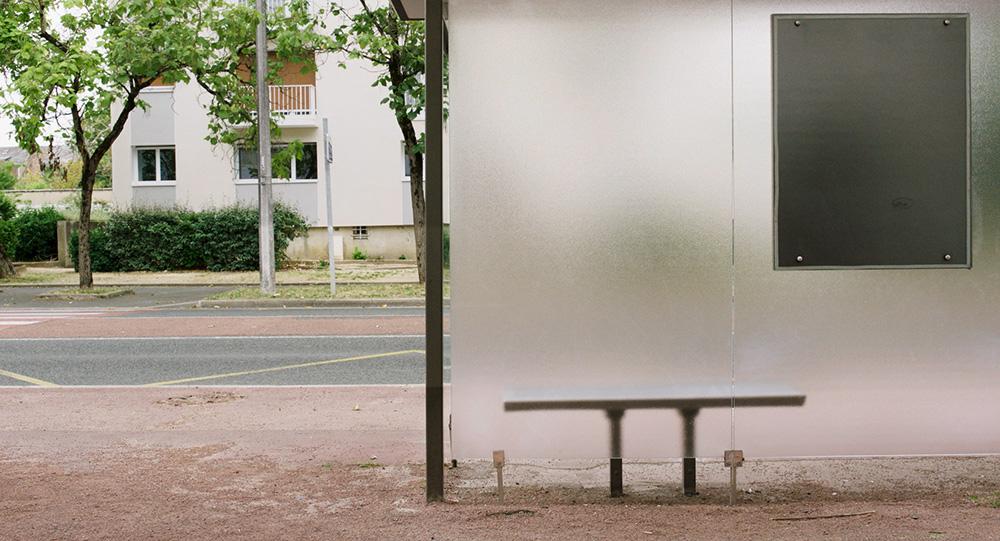
Synopsis
Eine Bushaltestelle, ein Platz, ein paar Blocks an einer Ausfallstraße. Aus dem Bus steigt Zohra Hamadi, Metallstangen im Rücken. Sie geht aufrecht, kann endlich frei atmen. Doch Europa gewährt ihr nur ein paar Tage Gegenwart. Zohra Hamadi entscheidet sich, nach der Zukunft zu greifen. EUROPE erzählt die Geschichte einer staatlich erzwungenen Fiktionalisierung.
Die Bushaltestelle „Europe“ liegt an einer Ausfallstraße der französischen Stadt Chatellerault in einem kleinen Banlieue. Ein paar Blocks, eine Brasserie, ein Kebabladen und ein Bus, der zwischen Krankenhaus und Wald, einem Naherholungsgebiet vor der Stadt pendelt. Hier lebt Zohra Hamadi, 32, deren Sommer mit dem Ende einer langen Krankengeschichte beginnt. Zum ersten Mal in ihrem Leben kann Zohra aufrecht gehen, fast schmerzfrei - sie könne ab jetzt ein ganz normales Leben führen, sagt der Arzt, dem sie ihre körperliche Freiheit verdankt. Ein ganz normales Leben: Zohra hat ihre Wohnung in einem der Blocks, rundherum wohnen Familie und Freunde, Arbeit hat sie bei einer NGO gefunden, die mit Altkleidern handelt. Wäre da nur nicht ihr Ehemann Hocine, der in Algerien darauf wartet, endlich ein Visum im Rahmen der Familienzusammenführung zu bekommen und das nächste Flugzeug zu Zohra nach Frankreich zu besteigen.
Es ist Sommer, Ende Juli, und ganz Frankreich bereitet sich auf die Ferien vor, diesseits und jenseits des Mittelmeers. Zohra braucht nur noch die Verlängerung ihrer Aufenthaltsgenehmigung, dann wird auch sie aufbrechen, um wenigstens ein paar Wochen mit Hocine in den algerischen Bergen zu verbringen. Doch die Verlängerung bleibt aus: Mit dem Ende ihrer Behandlung verliert Zohra ihr Aufenthaltsrecht in Frankreich. Sie wird - für ihr Umfeld wie für das Kinopublikum - zu einer in die Unsichtbarkeit verbannten, zum Schweigen gebrachten Protagonistin. Nur durch die Augen und die Reaktionen der anderen wird spürbar, wie Zohra um die Rettung ihres Lebens in der ersehnten Normalität ringt: wie sie keine Schwäche zeigen will, sich in Lügen verstrickt, wie ihre Welt bröckelt. Zohra verliert ihre Arbeit und ihre Wohnung. Familie und Freunde brechen auf, sie bleibt allein zurück in einer entleerten Welt.
Diese entleerte Welt wird für Zohra, ausgestattet mit einer Handvoll Schlüssel für die Wohnungen der anderen, zur Bühne. Sie wird sichtbar, indem sie ihre Zukunft erfindet, und nicht nur eine, sondern verschiedene, die sie in Varianten durchspielt. Ihre Fiktionen, mal subtil, mal anmaßend bürgerlich, surfen knapp über dem Boden der Tatsachen und ziehen uns in ein Verwirrspiel parallel sich entfaltender Realitäten. Sie lebt mit Hocine oder auch nicht, hat eine Familie, vielleicht, einen neuen Job, eine Aufenthaltsgenehmigung.
Mit dem Wiedererlangen ihrer fiktionalen Sichtbarkeit beginnt für Zohra der Kampf um ihren Platz in Europa, auch wenn sie dafür immer häufiger das Szenario wechseln muss. Dadurch bekommt sie etwas Transparentes, Geisterhaftes - aus der Flüchtenden wird eine Flüchtige, die sich dem systematischen Griff der staatlichen Gewalten entzieht.
Credits
Cast
Zohra Rhim Ibrir
Arzt Thierry Cantin
Busfahrer Didier Cuillierier
Nesrins Tochter Khadra Khadra Bekkouche
Nesrins Tochter Imane Nouria Lakhrissi
Nesrin Sadya Bekkouche
Farid Hassane Ziani
Oma Zoulikha Ibrir
Zohras Kollegin Amandine Demuynck
Nachbarin (Hostess) Nawel Kefif
Physiotherapeut Frédéric Guesdon
Nachbarin (Paar) Sarah Boukhennoufa
Nachbar (Paar) Nordine Kefif
Sachbearbeiter Präfektur Thomas Blanchard
Kollegin Sachbearbeiter Jane Resmond
Anwältin Laurence Masliah
Omar Marwane Sabri
Crew
Buch Merle Kröger, Philip Scheffner
Regie & Schnitt Philip Scheffner
Regieassistenz Pascal Capitolin
2. Regieassistenz João Carvalho
Script / Continuity Julia Colin
Bildgestaltung Volker Sattel
Kameraassistenz Thilo Schmidt, Dirk Lütter
Oberbeleuchter Tarek Shayne Tabet
Set-Fotograf & Übersetzer Houari Bouchenak Khelladi
Tonmeister Tristan Pontécaille
Tonassistenz Colin Barthe
Kostüm Sandrine Bonheure
Szenenbild Nicolas Lefebvre
Requisite Sonia Cailler
Laien-Casting P. Scheffner, P Capitolin, C. Kirberg
Schauspieler-Casting Bahijja El Amrani
Sound Design & Mischung Simon Bastian
VFX Domingo Stephan
Colour Grading Matthias Behrens
Herstellungsleitung Caroline Kirberg, Thomas Micoulet
Produktionsleitung Frankreich Nathalie Aubaret
Set-Aufnahmeleitung Frankreich Delphine Cazelle
Produzentinnen Caroline Kirberg, Merle Kröger
Koproduzentin Meike Martens
Koproduzenten Thomas Micoulet, Karim Aitouna
Redaktion Rolf Bergmann
Produziert von pong film, Berlin, Deutschland
Koproduziert von
Haut les Mains Productions, Lyon, Frankreich
Blinker Filmproduktion, Köln, Deutschland
Rundfunk Berlin-Brandenburg, Berlin, Deutschland
Auvergne-Rhône-Alpes Cinéma, Villeurbanne, Frankreich
Drehbuch gefördert von Die Beauftragte der Bundesregierung für Kultur und Medien (BKM)
Präsentiert beim Venice Gap-Financing Market 2019
Produktion gefördert von
BKM
Eurimages
Medienboard Berlin-Brandenburg
Région Nouvelle-Aquitaine mit dem CNC
Région Auvergne-Rhône-Alpes mit dem CNC
Film und Medien Stiftung NRW
Filmförderung Hamburg Schleswig-Holstein
Kinoverleih Deutschland Grandfilm
World Sales Square Eyes
Kontakt Produktion pong
Caroline Kirberg
E-mail: kirberg(at)pong-berlin.de
Tel: +49-(0)30-61076098
Visuals
Mehr Infos
-
Festivals
Weltpremiere: Berlinale, Germany (10 – 20 February, 2022)
Forum Special Mention FriedensfilmpreisInternationale Premiere: Visions du Réel International Film Festival, Switzerland (7 – 17 April, 2022)
Burning Lights Competition Special MentionWeitere Festivals 2022-23:
- Crossing Europe Film Festival, Austria (27 April – 2 May, 2022)
Panorama - Play-Doc International Film Festival, Spain (4 – 8 May, 2022)
International Competition - New Horizons International Film Festival, Poland (21 – 31 July, 2022)
Out of Competition: The Third Eye - Atlàntida Film Festival, Spain (24 July – 24 August, 2022)
Main Online Programme - Doclisboa, Portugal (6 – 16 October, 2022)
New Visions - International Bosphorus Film Festival, Turkey (21 – 28 October, 2022)
International Feature Film Competition - Filmmaker Festival, Italy (18 – 27 November, 2022)
International Competition - International Documentary FF Amsterdam, the Netherlands (9 – 20 November, 2022) Paradocs
- Solidarity Human Rights Film Festival, Israel (1 – 10 December, 2022)
Competition - Transcinema International Film Festival, Peru (2 – 10 December, 2022)
Competition - Kolkata International Film Festival, India (15 – 22 December, 2022)
Official Competiton – Innovation in Moving Images section - SANFICI – Santander International Independent FF, Colombia (20 – 24 February, 2023)
Competencia Internacional de Largometrajes
- Crossing Europe Film Festival, Austria (27 April – 2 May, 2022)
-
fact sheet
Produktionsjahr: 2021/22
Produktionsländer: Deutschland, Frankreich
Länge: 105 Minuten
Format: Bild DCP 2k | 1:1,85 / 16:9 | Farbe
Format: Ton 5.1 / stereo
Sprachen: Französisch & Arabisch mit englischen / deutschen / französischen Untertiteln